Hillary Clinton And Bernie Sanders Clash In First One-On-One Debate
With the Vermont Senator holding a seemingly insurmountable lead in New Hampshire, Bernie Sanders and HIllary Clinton clashed last night in their most contentious debate yet.
With the race for the Democratic nomination now officially down to the only two serious contenders that have ever really been in the race, last night’s debate in New Hampshire between Hillary Clinton and Bernie Sanders proved to be quite contentious, with the two candidates essentially battling over which one of them was the true “progressive,” and over Clinton’s ties to Wall Street and her past votes in favor of the Iraq War:
DURHAM, N.H. — In a caustic debate on Thursday night, Hillary Clinton accused Senator Bernie Sanders of leveling “attacks by insinuation and innuendo” against her integrity and her credentials as a progressive by portraying her as beholden to wealthy interests and corporations.
Mrs. Clinton, lobbing her harshest assault yet in their race for the Democratic presidential nomination, said months of criticism by Mr. Sanders over her taking speaking fees from Wall Street banks amounted to a suggestion that she was corrupt — or, as she put it, a “very artful smear.” It was the sort of cutting remark she usually reserves for Republicans, and it drew boos from many in the audience at the University of New Hampshire.
“There is this attack that he is putting out, which really comes down to, anybody who took donations or speaking fees from any interest group has to be bought,” she said. “And I just absolutely reject that, senator. And I really don’t think these attacks by insinuation and innuendo are worthy of you. Enough is enough. If you’ve got something to say, say it directly.”
Mr. Sanders, who largely kept his cool in the debate, ignored the broadside and instead reiterated his familiar critique that a “super PAC” supporting Mrs. Clinton is funded in part by banks.
“There is a reason why these people are putting huge amounts of money into our political system,” Mr. Sanders said. “It is undermining American democracy and it is allowing Congress to represent wealthy campaign contributors and not the working families of this country.”
The ferocity of Mrs. Clinton’s remarks in the debate was risky, given that many voters, including some Democrats, already have an unfavorable opinion of her. She is also running far behind Mr. Sanders in the polls leading up to Tuesday’s primary in New Hampshire, and her attacks — while geared toward undercutting his popularity here — might backfire with some undecided voters who have positive feelings about Mr. Sanders.
Mrs. Clinton, appearing tense and even angry at times, was particularly sensitive about receiving millions of dollars in speaking fees, including $675,000 for three speeches from Goldman Sachs. She downplayed her turn on the lecture circuit, noting that she had also addressed other groups such as the American Camping Association and that the banks merely wanted to hear her views on world affairs.
But she did acknowledge that she had not “done the job I should in explaining my record” about financial regulation, suggesting that is why she had been unable to beat back questions about her speaking fees. Yet when asked if she would release all the transcripts of her speeches to banks, she hedged.
“I will look into it,” she said. “I don’t know the status, but I will certainly look into it.”
From its opening moments, the debate devolved into a series of searing exchanges over one overarching theme: which of the two Democrats was the most progressive, an issue that they have been fighting over in recent days as they compete in New Hampshire. On one level, the debate was over semantics: The candidates share a similar worldview about aggressive government support for universal health care, public education and aid to the poor, and both of them used the word “rigged” to describe the American economy.
But they kept putting their own personal spin on the word “progressive,” with Mrs. Clinton deriding Mr. Sanders as the “self-proclaimed gatekeeper for progressivism” and accusing him of judging her unfairly. Rebutting Mr. Sanders’s claim that she is a political moderate, Mrs. Clinton sought to align herself with some of the most popular names in Democratic politics to suggest that Mr. Sanders was impugning them, not just her, with what she described as a purity test.
“The root of that word, progressive, is progress, but I’ve heard Senator Sanders’s comments and it’s really caused me to wonder who’s left in the progressive wing of the Democratic Party,” Mrs. Clinton said. “Under his definition, President Obama is not progressive because he took donations from Wall Street.”
Mr. Sanders, asked if President Obama was a progressive, at first did not answer the question, instead bringing up a comment by Mrs. Clinton when she called herself a moderate. But he ultimately took on the question. “Do I think President Obama is a progressive? Yeah, I do,” Mr. Sanders said. “I disagree with him on a number of issues, including the trade agreement, but, yes, I think he has done an excellent job.”
Mrs. Clinton, who is leading in national polls and narrowly won the Iowa caucuses on Monday, departed from the approach she used at Democratic forums late last year when she largely ignored Mr. Sanders and focused her fire on Republicans. On Thursday, though, there was only a fleeting mention of Donald J. Trump as she went after Mr. Sanders with an intensity that reflected a nomination fight worthy of the name.
She portrayed herself as a veteran of the country’s political wars who is better equipped to enact a progressive agenda than her more uncompromising rival. It was not a message likely to resonate among Mr. Sanders’s idealistic young legions in New Hampshire, but it presaged the one she is likely to carry when the primary moves to Nevada and South Carolina, more moderate states, later this month.
(…)
While their disagreements were more muted, the two also clashed over foreign policy. And, once again, it was Mrs. Clinton going on the offensive. She suggested the senator was naïve for wanting to insert Iranian troops into Syria and suggested he would be too hasty to normalize relations with the government of Iran.
“You are voting for both a president and a commander in chief,” she said, speaking directly to voters.
Mr. Sanders responded by invoking her 2002 vote to authorize the Iraq war to question her judgment and recalled that, in the 2008 Democratic primary, she had called Mr. Obama naïve “because he thought it was a good idea to talk to our enemies.”
Mrs. Clinton, asked if Mr. Sanders could win the general election, said she had “great respect” for the Sanders campaign but believed he would “face the most withering onslaught from Republicans.” She then tacitly suggested that Mr. Sanders’s left-wing views would not be popular in some states in November.
“It will put the nominee into the spotlight,” she said. “I’ve been vetted. There’s hardly anything you don’t know about me.”
Mrs. Clinton said she was “100 percent confident” that she did not face any legal threat from the federal investigations into her use of a private email server as secretary of state. Mr. Sanders, in turn, said he would stand by his past pledges not to politicize the issue.
The Washington Post’s summary of the night is largely similar:
DURHAM, N.H. — Hillary Clinton and Bernie Sanders, meeting Thursday night for their last debate before the New Hampshire primary, squared off fiercely on the question of whether the party should strive toward its liberal aspirations or set its sights on the achievable.
The dynamic between the two contenders for the Democratic presidential nomination was far more intense — and far more personal — than it has been in their previous face-offs. That reflected how close their race has become in the wake of a virtual tie in Monday’s Iowa caucuses. The debate was sponsored by MSNBC and the New Hampshire Union Leader.
Clinton used her opening statement to needle the senator from Vermont, who describes himself as a democratic socialist, over what she has contended are unrealistically liberal plans for universal health care, free college and other programs.
“I’m fighting for people who cannot wait for those changes, and I’m not making promises that I cannot keep,” the former secretary of state said.
Sanders replied that a number of European countries had approved single-payer health-care systems. “I do not accept the belief that the United States of America cannot do that,” he said.
As they had at a town hall forum the night before, the two remaining Democratic presidential contenders also squabbled over the modern definition of the word “progressive,” which has become the preferred term for the Democratic left.
“A progressive is someone who makes progress,” Clinton said.
Sanders, who enjoys enormous enthusiasm among the party’s liberal base, continued to make the argument that Clinton is too heavily dependent on those who have financed her campaign and made her personally wealthy. He said that he does “not only talk the talk, but walk the walk. I am very proud to be the only candidate up here that does not have a super PAC.”
Clinton accused Sanders of engaging in a “very artful smear” of her character. She insisted she had never changed her position on any issue based on having received contributions from special interests.
“Senator Sanders has said he wants to run a positive campaign. I’ve tried to keep my disagreements over issues, as it should be. But time and time again, by innuendo, by insinuation, there is this attack that he is putting forth,” Clinton said.
Defending the paid speeches she gave in the period between leaving the State Department and announcing her presidential campaign, Clinton said she may not have done a good job of explaining what she was doing.
“They wanted me to talk about the world” and how she saw threats and challenges, Clinton said of the groups that paid her fees of $200,000 and more.
Asked whether she would release transcripts of closed-door, paid speeches, Clinton replied, “I will look into it.”
[Annotated transcript of the Democratic debate]
The two contenders, voices raised, argued over whose plan and ideas would more effectively police Wall Street and the larger financial system.
“Break them up!” Sanders thundered, referring to the nation’s biggest banks.
Clinton said leading economists have judged her regulation proposals to be tougher.
But Sanders kept bringing the argument back to her ties to Wall Street. Through the end of December, the financial industry had given at least $21.4 million to support Clinton’s 2016 presidential run — more than 10 percent of the $157.8 million amassed to back her bid, according to an analysis of Federal Election Commission filings by The Washington Post.
Clinton also was asked whether she could guarantee that repercussions from her use of a private email system at the State Department would not “blow up” her campaign. She said she is “100 percent confident” that an FBI security review will come to naught.
“I have absolutely no concerns about it,” she said.
With the debate stage cleared of candidates who were never really serious contenders to begin with, Clinton and Sanders seemed to feel freer to attack each other more directly, and more sharply, than we’ve seen in the past. On Clinton’s part, the renewed ferocity with which she went after Sanders was reminiscent of the style she adopted during the height of the battle against Barack Obama eight years ago. This was a contrast with the more hands-off approach she had been taking with the Senator from Vermont up until now and suggests quite strongly that her campaign both sees Sanders as more of a threat than they probably did in the past and that they realize that they need to act quickly to regain the narrative in the race lest the battle for the Democratic nomination start to mimic 2008 and drag out for most of the Spring rather than wrapping itself up sooner. Much like Clinton had trouble eight years ago countering the message and the image that Barack Obama was sending during their campaign, though, Clinton and her campaign still seem to be somewhat perplexed about how to best counter Sanders message and his attacks on Clinton’s record and her ties to Wall Street. Additionally, one can see at least some similarities between Sanders’ campaigns and the Obama 2008 campaign in that both candidates seem to have hit a nerve with younger voters and progressive Democrats, who have enthusiastically rallied around their candidate, in this case even though every bit of campaign logic would tell you that Bernie Sanders is not the kind of candidate who can win a General Election.
Looking at the polls, it’s easy to see why the Clinton campaign is likely getting concerned that the Sanders campaign may evolve into something that will force them to relive the 2008 battle for delegates that didn’t end until the very last contest in June. The immediate focus of the debate, though, was the primary next week in New Hampshire, which Clinton continues to face a seemingly insurmountable Sanders lead with only a few more days of campaigning left. A new CNN/ORC poll, for example, shows Sanders leading Clinton by a two-to-one margin 60% to 31%, while a new poll from NBC News and Marist College shows Sanders with a slightly smaller twenty point lead at 58% to 38%. Sanders’ lead is somewhat smaller in the two New Hampshire tracking polls, but still quite substantial. The ARG tracking poll puts the race at 54% to 38% in favor of Sanders, while the UMass Lowell poll has the race at Sanders 55% Clinton 40%. All of this gives Sanders an average 20.5 point lead according to RealClearPolitics, a number that suggests that while Clinton may be able to close the gap between now and Tuesday it seems unlikely that she’ll be able to pull of a win absent massive movement in the polls. For what it’s worth, last night’s debate does not seem as though it will move the needle very much at all. On top of all of that, Quinnipiac is out with a new poll that puts Sanders within two points of Clinton nationally, a significant dent in Clinton’s lead in national polling. Clearly, to the extent there has been momentum coming out of Iowa, it’s all been toward Sanders.
If Sanders wins in New Hampshire as expected, then the Clinton campaign is likely to be thrown back on its heels even more than it already has been and the first task for the team will be to look for wins that can push back against the narrative of a campaign in crises. Fortunately for Clinton, the next two contests are in Nevada and South Carolina, where polling shows her in a comfortable lead, although its worth noting that polling in both states has been minimal at best and neither state has been polled since the results in Iowa so it’s unclear what impact the events of the past week or so has had on the race in those states. If Clinton can hold on to her strong leads there, though, she should be able to right the ship fairly quickly. The question at that point is how well Sanders will be able to compete in multiple states at one time. Based on his fundraising, he seems to have the resources to at least mount a credible campaign, but it’s unclear if he has any real ground operation to speak of in the states that will be the focus of the nation when March rolls around. Whether he does or not, though, at the very least it’s clear that Sanders is giving Clinton a far sharper, harder battle than she probably thought she’d face.
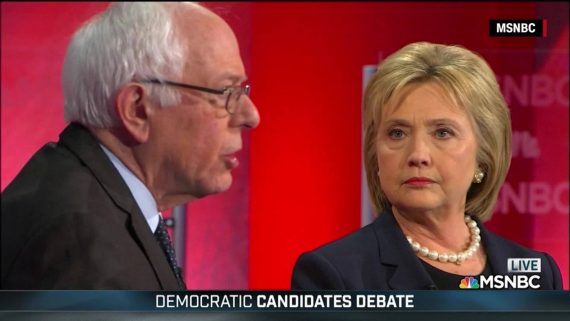

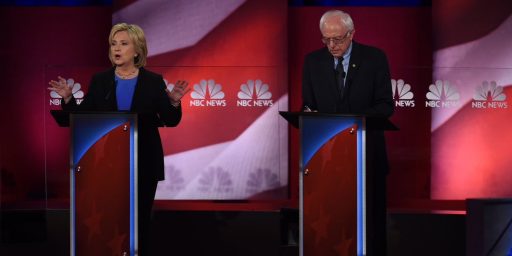
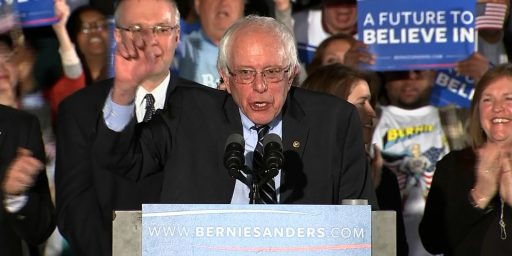
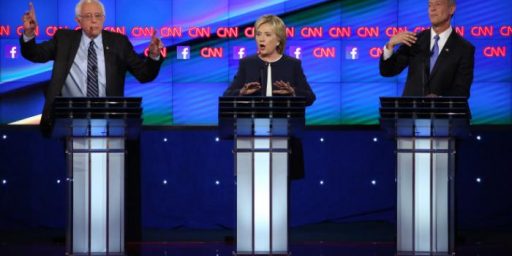
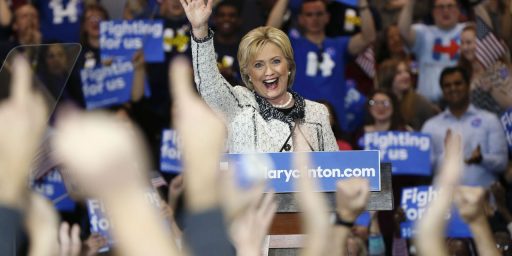
January labor data…150,000 jobs and 4.9% unemployment.
70 straight months of private sector job creation.
A Government that has an almost record low number of employees per capita..and a falling deficit.
What is it you Republicans don’t like about this President???
And the national average for gas is $1.80.
Say good-bye to that if we elect a Republican.
And oh-by-the-way…Condeleeza Rice and Colin Powell had emails that were retro-actively classified too.
Are they all going to be indicted?
@C. Clavin: Peak oil is a reality, over time gas is going to higher no matter who’s elected whether it be republican, democrat, or green party.
@C. Clavin: Just so your aware, although I doubt you care because it doesn’t fit into your personal narrative, but recessions generally start with job gains while losses peak after the recession is ended. Don’t believe me? Look it up for yourself, the data is available on the “FRED” website for anyone to check. Whether you want to believe it or not, the economy is getting weaker, there’s a good chance we’ve been in a recession since Dec. Check the latest factory orders data that came out yesterday. The only way anyone would describe it would be a disaster.
@C. Clavin:
Your comments are not on topic to the subject matter of the post.
Please review our comment policies.
@C. Clavin:
That’s an easy question to answer – because he is a Democrat. The Republicans can’t stand the idea that the economy improves during a Democratic while the last Republican administration nearly destroyed the economy. It’s really the same reason they hated Bill Clinton. The 150 job creation number is not great but sure beats the 800 thousand job losses a month when Obama took office.
The reality is that Republican policies are hazardous to the economy.
It’s conceivably true that some politicians do not change their position on an issue merely because somebody contributed money to their campaign. But the big money usually comes with access. The politician gets an earful of opinions in addition to the money, opinions that are rarely representative of the general public. And I don’t care how disciplined you are, but if you only listen to arguments from one side of a debate, you are more likely to agree with that side.
So it’s not that Hillary accepts money from Wall Street. It’s that she has so many “friends” on Wall Street, who also happen to be contributing money to her campaign.
That said, she’s probably better in this regard than 92% of the Republican candidates.
Fairly interesting debate, but nothing new or unexpected. What I would have liked to have heard were their views on the Federal Reserve, the deficit, and the China situation.
I don’t particularly disagree with anything Sanders is saying, but I don’t think he’s remotely electable or has a chance to deliver on what he’s promising. I don’t think there would be much of a difference between a Hillary Clinton or Bernie Sanders presidency (and why would there be, they are both Democrats), so I’m solidly for Hillary.
@Avid sportman: We may well be headed for recession. They happen every now and again. Especially when the rest of the world is down. If one happens, it will be bad for Hillary. How does that change anything @C. Clavin: said? Even if we do start into recession, it’s been a remarkable run.
Lincoln/Douglas it wasn’t, yet each was able to speak and let their base claim victory. Will be interesting when foreign affairs and climate come up in the topic list.
This remark isn’t getting the attention it deserves. The media is focusing on the attack, on the wording of “artful smear” — which itself is worth dissection and discussion — but they completely elide how she’s echoing the opinions of the majority opinion in Citizens United by saying unfettered donations in politics do not influence political views.
Also, I imagine if you’re trying to prove yourself a progressive, citing the approval of Henry Kissinger is not the way to do it. And if you’re trying to deny your competitor is a progressive, saying a dude roughly within her ideological confines counts is a horrible idea. After last night, I’m not sure the word “progressive” means anything.
@gVOR08: Just trying to point out that 150,000 jobs and 4.9% unemployment isn’t necessarily indicative of a strong economy and doesn’t fit the argument that everything with the economy is improving or going to continue to improve. Can’t disagree that up to this point the economy has rebounded quite well under the current president, but I wasn’t trying to make that point. I do have an honest question, one that I haven’t seen anyone try to answer. If we have an equally bad recession that we did in 08-09, who gets the blame? Obama and Democrats by proxy? He’s been the president and has touted the rebound as one of his big wins. Is this a case of you take then credit then do you get the blame? Republicans have been in control of the house for 6 of his 8 years (and have gained senate seats as well), and have been less that helpful (understatement of the year). I wouldn’t think that would go unnoticed by the electorate.
@Tillman:
Part of the problem is a question of absolute scales vs. relative scales. Compared to any Republican candidate, both Hillary Clinton and Bernie Sanders are progressives. But then, compared to Gary Coleman, both Stephen Colbert and Tim Duncan are really tall. Is Stephen Colbert “really tall”? No, not in any absolute sense.
@DrDaveT: I happened to catch most of that. One of the sillier discussions I’ve heard, even for a political debate. They really disagree little on goals, the differences are priorities and tactics. I agree strongly with Bernie that money is the root of all of our political problems, but I don’t see what he can do about it except SCOTUS appointments, which any Dem will do OK on, given the chance. But I do think Hillary would be better at finagling them through the Senate. Plus it makes them sound like a bunch of GOPs arguing about who’s a true conservative.
@David M: The one question no moderator at a Democratic debate has thus far asked: “given the certitude of a Republican-dominated House, and the near-certitude of a Republican-controlled Senate, in your hypothetical first term how do you plan on fulfilling any promises you’ve made thus far?”
See, this isn’t a horse-race question. This is a process question, and by its very nature it is boring to people watching debates. It is, however, the most important question of them all. It exposes, as you rightly note, that there really wouldn’t be much of a difference between a Clinton presidency and a Sanders presidency. Maybe a few appointments change at the margins. Everyone gets their Democratic Party-approved SCOTUS nominations that go as far as Republicans allow them to.
The only thing to debate is image, and that’s coming down to preference more than any objective fact. Does a woman mostly perceived as cravenly ambitious and nefarious gain the nomination, or does a man rightly perceived as a cantankerous ideologue get it? Do we concentrate on the whims of the older 35s with their triangulated, ’90s-era preferences, or do we focus on the whims of the under 35s and their surprising acceptance of trimmed communism? There’s just a large variety of superficialities to occupy ourselves over.
The foreign policy section calcified this for me. Neither Clinton nor Sanders had good foreign policy answers. What Clinton had instead was a mastery of the vocabulary, and the ability to project confidence with it. Her surgery-style warmongering (no boots on the ground, but we have special forces!) has proven absolutely incapable to change anything in the Middle East. Sanders was a doddering fool in comparison (North Korea is the greatest geopolitical threat to the United States?), but there wasn’t much of a meaningful difference between them aside from image. Do you prefer your presidential nominee to look and sound this way, or this way?
I’ve stopped trying to begrudge people on image preferences. It’s a losing battle.
@David M:
My problem with Sanders is not merely his frequent claims that he is a Democratic Socialist, but his other rhetoric. His frequent calls for a political revolution and claiming that Wall Street makes its money through fraud are going to be captured out of context so that he sounds like the next coming of Karl Marx. That makes me agree with you that he is not remotely electable.
@Tillman:
I think the defining quality of a Sanders presidency would be how little he could accomplish compared to his promises. And this would be degrees of magnitude larger than the similar disappointment in Obama’s terms. Sure, Obamacare and Dodd-Frank don’t go as far as some liberals or progressives would like, but they are still accomplishments. I think Sanders is promising more than Obama was, but will deliver less. I don’t see that ending well.
@David M: Good negotiators shoot for the moon; they don’the start with the bare minimum and negotiate down from there. Sanders is advocating better policies and a better strategy for advancing them than Clinton.
And yet it seemingly has gone unnoticed by the electorate in that Republicans still control Congress…
@Ben Wolf:
“”Good negotiators shoot for the moon; they don’the start with the bare minimum and negotiate down from there.”
Unfortunately, Sanders is not negotiating with the American public. He’s applying for a job. And promising more than you can deliver is a way to end up with a very unhappy boss.
“Sanders is advocating better policies and a better strategy for advancing them than Clinton.”
Policies is a matter of personal taste. Strategy, no. His strategy is to say we need campaign finance reform, which will cure everything. And saying one change will cure everything is every bit as silly when Sanders says it for campaign finance reform as when Republicans say it for tax cuts for the rich.
It is also a non-starter politically in a Republican held House (which is not changing for at least the rest of this decade), and even if it were passed in Congress, it would then face a hostile Supreme Court.
@Ben Wolf:
“A better strategy”? What exactly is that? Because all I’ve seen is the bald, unsupported assertion that there will be a political revolution that will force the GOP to concede. Basically, the progressive version of the GOP’s “Green Lantern” foreign policy strategy (or Donald Trump’s asserted strategy for everything).
@David M: I think playing the expectations game when the realistic expectation is “nothing” or at best “keep on keepin’ on” is pointless.
The Sanders supporter in me would make some blasé observation that Clinton would be desperate for compromise of any kind given how triangulation went two decades ago, but I honestly don’t think she could pull it off without the base revolting. We’re too polarized for it. The criticisms each Dem faction has for the strategy of the other are mind-bogglingly minor in the face of one party dominating Congress for the foreseeable future. The kind of wave election necessary to dislodge Republican control is beyond Clinton or Sanders.
And some expects collected by Vox weigh in on whether Sanders is electable:
“We posed that question to six of the country’s top political scientists, and their answers were broadly consistent: Under some unlikely circumstances, Sanders could win a general election. But nominating him would make it significantly more difficult for Democrats to keep the White House.”
@Moosebreath: No, that is incorrect.
@Ben Wolf:
“No, that is incorrect.”
Well, that’s a convincing rebuttal to my positions. Or something.
@Moosebreath: Indeed.
I am finding it hard to really feel engaged in this contest because, for me, it is purely a preference decision, and I am fairly indifferent between the two acceptable choices.
I plan to vote for Bernie on March 1. In September, I will donate to whichever of the two is the Dem nominee, and in November, I will vote for that person. But there’s no fire behind any of it.
So Bernie isn’t electable but an ex actor who thinks trees kill, that gov’t is the problem, that the EPA is un-necessary, that the New Deal was a horrible idea, who thinks unions should be destroyed, that rich people are picked on and should be unfettered so as to pass on all of their wealth without being taxed, and that we need to go overboard in our paranoia and double our defense spending against an over-extended empire on its last legs which in fact will cease to exist in a decade…..THAT GUY IS ELECTABLE?
Hell yes if you don’t believe in the incrementalists who think nothing is possible but little changes to the status quo so they aren’t affected by it.
@Ben Wolf:
That would be more convincing if we hadn’t seen this exact scenario play out over the last 6 years. The GOP has been starting negotiations with completely outrageous demands, but they haven’t gotten anything for it. Except for the GOP voters all out of patience that Obamacare and Dodd-Frank weren’t repealed and the Ryan budget wasn’t enacted. So the shoot for the moon theory would seem to be nonsense.
@David M: The only thing Republicans cared about were preserving capital gains cuts and reduced welfare spending. Which they got. Everything else is window dressing for the low-intelligence base.
Indeed, because the circumstances in 2016 are exactly like those in 1980…do tell how Sanders would be able to get 270 electoral votes…
@David M:
The “shoot for the moon theory” is nonsense. If one party in a negociation’s demands are utterly unrealistic, the other party is not going to say, “Let’s dicker until we split the difference.” No, they say, “This guy isn’t serious; screw him,” and walk away.
@rachel: You don’t understand.